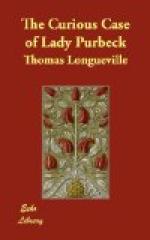About the year 1611, King James entertained the idea of reigning as an absolute sovereign. Archbishop Bancroft flattered him in this notion, and suggested that the King ought to have the privilege of “judging whatever cause he pleased in his own person, free from all risk of prohibition or appeal.” James summoned the judges to his Council and asked whether they consented to this proposal. Coke replied:—
“God has endowed your Majesty with excellent science as well as great gifts of nature; but your Majesty will allow me to say, with all reverence, that you are not learned in the laws of this your realm of England, and I crave leave to remind your Majesty that causes which concern the life or inheritance, or goods or fortunes of your subjects are not to be decided by natural reason, but by the artificial reason and judgment of law, which law is an art which requires long study and experience before that a man can attain to the cognizance of it.”
On hearing this, James flew into a rage and said: “Then am I to be under the law—which it is treason to affirm?”
To which Coke replied: “Thus wrote Braxton: ’Rex non debet esse sub homine, sed sub Deo et Lege.’"[8]
Coke had the misfortune to offend the King in another matter. James issued proclamations whenever he thought that the existing law required amendment. A reply was drawn up by Coke, in which he said: “The King, by his proclamation or otherwise, cannot change any part of the common law, or statute law, or the customs of the realm.” This still further aggravated James.
Meanwhile Bacon, now Attorney-General, was high in the King’s favour, and he was constantly manoeuvring in order to bring about the downfall of his rival. He persuaded James to remove Coke from the Common Pleas to the King’s Bench—a promotion, it is true, but to a far less lucrative post. This greatly annoyed Coke, who, on meeting Bacon, said: “Mr. Attorney, this is all your doing.” For a time Coke counteracted his fall in James’s favour by giving L2,000 to a “Benevolence,” which the King had asked for the pressing necessities of the Crown, a benevolence to which the other judges contributed only very small sums. This fair weather, however, was not to be of long duration.
In 1616 Coke again offended the King. Bacon had declared his opinion that the King could prohibit the hearing of any case in which his prerogative was concerned. In the course of a trial which shortly afterwards took place, Bacon wrote to the judges that it was “his Majesty’s express pleasure that the farther argument of the said cause be put off till his Majesty’s farther pleasure be known upon consulting him.” In a reply, drawn up by Coke and signed by the other judges, the King was told that “we have advisedly considered of the said letter of Mr. Attorney, and with one consent do hold the same to be contrary to law, and such as we could not yield to by our oaths.”




